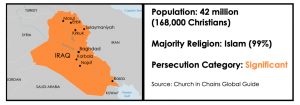
The Republic of Iraq is situated in the area known in ancient times as Mesopotamia, the site of the Sumerian, Assyrian and Babylonian empires.
Oil brought wealth to Iraq, but the 1980-88 war with Iran and the Gulf War (sparked by Iraq’s invasion of Kuwait in 1990), followed by 13 years of UN sanctions, had a devastating effect on its economy and society.
The US-led invasion of 2003 (and the ousting of President Saddam Hussein) was prompted by Iraq’s alleged possession of weapons of mass destruction, which were never found. Power was transferred to an interim Iraqi government in June 2004, followed by elected governments, but ongoing violence – most of it perpetrated by Sunni Muslim extremists against Shia Muslims and Christians – caused hundreds of thousands of Muslims and Christians to leave the country and displaced many more internally, particularly in the semi-autonomous region of Kurdistan in northeastern Iraq, which is governed by the Kurdish Regional Government based in Erbil.
From summer 2014 Islamic State militants advanced across central and northern Iraq, causing terror, death and displacement – about 3.3 million Iraqis were displaced within the country, many to Erbil. Islamic State was militarily defeated in 2017 but the country remains unstable, with many Islamist militants still active.
Christians in Iraq
Iraq’s Christian population once constituted one of the largest Christian communities in the Middle East, numbering about 1.5 million in 1990. Over 80 per cent of Iraq’s Christians have since left the country due to war and sectarian violence and most of those who remain are displaced.
Most Iraqi Christians are Catholic or Orthodox and trace their history back to the first century. The evangelical community is small, with some members coming from Muslim backgrounds. There is strong family and societal pressure against those who leave Islam.
Anti-Christian violence began after the Gulf War and increased after the fall of Saddam Hussein’s regime in 2003. Under his regime Christians had been tolerated, but following the invasion Christians came to be perceived as Western collaborators. Islamist extemists killed hundreds of Christians and attacked several churches. Many attacks took place in the northern city of Mosul (Iraq’s second city and site of the Biblical city of Nineveh) which had a relatively high proportion of Christians compared with other Iraqi cities.
Thousands of Christians fled to neighbouring countries or to the Kurdish region, where Christians do not experience the same level of persecution. Between 2003, when Islamic extremists began targeting Christians, and the end of 2010, at least 500,000 Iraqi Christians were driven out of Iraq and two thirds of Baghdad’s churches were either closed or destroyed.
In 2014, Islamic State (IS) militants seized control of large parts of the country, including the Nineveh Plains region where most of Iraq’s Christians lived, committing terrible atrocities against the inhabitants – especially Christians and Yazidis – and destroying large numbers of churches and monasteries. Most of the large Christian community in Mosul and the surrounding towns and villages on the Nineveh Plain fled to Kurdistan (Kurds are mostly Sunni but reject the extremist Islam of IS).
Although Islamic State was militarily defeated in 2017, most Christians have not returned to their homes due to continuing militant attacks and the influence of Iran-backed militias (allowed by the Iraqi government) that control checkpoints in the region and stop Christians and Yazidis returning. Many families have emigrated from Erbil to Europe, the United States or Australia in search of peace and opportunities for their children.
Church in Chains in Action
Since 2015, Church in Chains has sent aid to Iraqi Christians via partner organisation Steadfast Global. Over €62,000 was distributed in the years 2015-2018 to support Christians from Mosul and the Nineveh Plains region who fled to Iraqi Kurdistan following the Islamic State takeover in 2014. The aid was used to provide basic needs such as food, clothing, fuel, medical care and sanitation. In April 2018, Malcolm Macleod of Steadfast Global visited Ireland to update Church in Chains supporters on the situation in Iraq and to tell them how their aid was being used.
